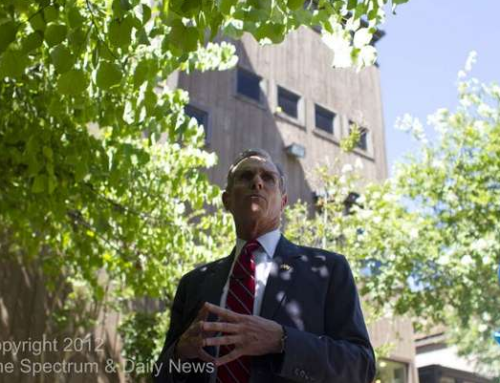
A change in political seasons
January 30, 2011
For link to story, Click Here
By Jan. 30, 2007, 11 Republicans had made formal moves — announcing exploratory committees or full-fledged candidacies — to run for president the following year. Four years later, only two notable candidates — talk-show host and businessman Herman Cain, and California political consultant Fred Karger — have made similar announcements.
March 9, 2006: John Cox, businessman, announced his candidacy. His campaign ended in late 2007.
Oct. 30, 2006: Duncan Hunter, California congressman, announced he was forming exploratory committee. He announced his candidacy on Jan. 25, 2007, and dropped out on Jan 19, 2008.
Nov. 20, 2006: Rudy Giuliani, former New York City mayor, filed paperwork for exploratory committee. He announced candidacy on Feb. 5, 2007, and dropped out on Jan. 30, 2008.
Nov. 16, 2006: John McCain, senator from Arizona, filed to establish exploratory committee. He announced his candidacy on April 25, 2007.
Dec. 4, 2006: Sam Brownback, senator from Kansas, filed to establish exploratory committee. He launched his bid on Jan. 20, 2007, and dropped out Oct. 19, 2007.
Dec. 13, 2006: Tommy Thompson, former Wisconsin governor, filed to establish exploratory committee. He announced his candidacy on April 4 and dropped out on Aug. 12, 2007.
Jan. 3, 2007: Mitt Romney, former Massachusetts governor, filed to establish exploratory committee. He announced his candidacy on Feb. 13, 2007, and dropped out on Feb. 7, 2008.
Jan. 9, 2007: Jim Gilmore, former Virginia governor, filed to establish exploratory committee. He announced his candidacy on April 26 and dropped out on July 14, 2007.
Jan. 11, 2007: Ron Paul, congressman from Texas, filed to establish an exploratory committee. He announced his candidacy on March 12, 2007, and dropped out on March 6, 2008.
Jan. 16, 2007: Tom Tancredo, former Colorado congressman, announced that he would form an exploratory committee later that week. He announced his candidacy on April 2 and dropped out on Dec. 20, 2007.
Jan. 28, 2007: Mike Huckabee, former Arkansas governor, announced he would file to form an exploratory committee the next day. He dropped out on March 4, 2008.
June 2007: Fred Thompson, former US senator from Tennessee, formed a “testing the waters’’ committee. He declared he was running on Sept. 5. 2007. He dropped out on Jan. 22, 2008.
Herman Cain: Former chief executive of Godfather’s Pizza, former chairman of the Federal Reserve Bank of Kansas City, and host of Atlanta-based radio show. Cain, who has strong Tea Party support, announced on Jan. 12 he would form an exploratory committee.
Tim Pawlenty: Former Minnesota governor has been traveling widely to promote his book and explore a presidential run. He has pitched himself as a blue collar, “Sam’s Club Republican,’’ and said he will make a decision in March or April.
Mitt Romney: Former Massachusetts governor and former Bain executive has been seen as the establishment candidate, particularly for a party that tends to reward faithful stalwarts who lose in the previous nominating contest. Romney spent much of last year raising money and endorsing candidates in the midterm elections. He is not expected to announce until the spring.
John Thune: The South Dakota senator won his seat in an upset win in 2004 over incumbent Tom Daschle, the former majority leader. He is seen as a rising star — a Republican version of Barack Obama — and has been urged to run by Senate Minority Leader Mitch McConnell. Thune says he will make a decision soon.
Newt Gingrich: The former 10-term Georgia congressman and House speaker led the Republican takeover of the House in the mid-1990s. But following GOP loses in 1998, he resigned from both the speakership and his congressional seat. He toyed with running for president in 2008 but opted out. He said he would announce his intentions by the end of March.
Mike Huckabee: The former Arkansas governor surprisingly won the Iowa caucuses in 2008. As an ordained Southern Baptist minister, he won appeal from evangelical Christians, and his strong showing made it difficult for Romney to go head-to-head with Senator John McCain. Now host of a Fox News show, he said he would not make an official announcement until “the latter part of the summer, if at all.’’
Sarah Palin: The former vice presidential nominee has done little to stay out of the spotlight since the 2008 campaign. After resigning as Alaska governor, she has been a frequent presence in the media, commenting on national events and filming a reality TV show about life in Alaska. She has said she is considering a presidential run but has not given any sense of timing.
Michele Bachmann: The Minnesotan is starting just her third term in Congress but has created a national profile through television appearances, controversial statements, and prodigious fund-raising. A founder of the House Tea Party Caucus, she has been seen as a thorn in the side of House Republicans leaders, most recently for giving a televised response to the president’s State of the Union address that competed with the official GOP response. She visited Iowa earlier this month.
Haley Barbour
: The governor of Mississippi is a former chairman of the Republican National Committee who most recently ran the Republican Governors Association — and was hailed for his ability to raise money and capture corner offices. He said he wouldn’t announce any plans until after the legislative session wraps up in April.
Mitch Daniels: The Indiana governor, a former top official at Eli Lilly and Co., was budget director under George W. Bush (who gave him the nickname “The Blade’’ for his cost-cutting proclivities). He said he would not announce his plans until the legislative session wraps up in late April.
Rick Santorum: The former two-term congressman from Pennsylvania won a US Senate seat in 1994, where he rose to number 3 GOP leadership position but was handily defeated in his 2006 reelection bid. A social and fiscal conservative, he has been among the most active in traveling and hiring staff in early primary states, including New Hampshire. He said in an interview there was “zero chance’’ of him announcing anything before April.
Jim DeMint: The senator from South Carolina has antagonized establishment Republicans by endorsing numerous Tea Party-backed candidates during GOP primaries. He has denied that he will run for president but stirred speculation by announcing a trip to Iowa in March for a conservative forum.
Ron Paul: The Texan is entering his 11th term in Congress. He has twice run for president — in 1988 as the Libertarian nominee and again in 2008 for the Republican nomination — and attracted a devoted following. He consistently performs well in straw polls of the party faithful, including the Conservative Political Action Conference poll last year. His son, Rand, just won a US Senate seat in Kentucky. He has said he would consider another presidential campaign, but he has also said he’s mulling a US Senate bid in Texas.
Rudy Giuliani: Served two terms as mayor of New York, including during the Sept. 11, 2001, attacks. He sought the Republican nomination in 2008, but performed poorly in the early caucus and primary states. He said this month that he would consider another run for president.
SOURCES: Democracy in Action; candidate announcements and websites; news reports



